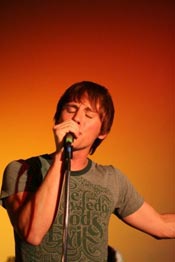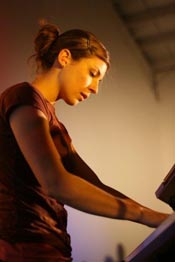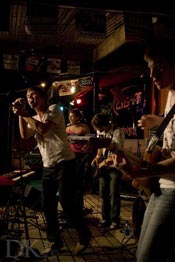There probably aren’t too many alternative rock bands coming out of Russellville, Arkansas, but you gotta start somewhere—and Deas Vail is a nice place to start.
Even though they’ve been around a few years and have recorded several albums, Deas Vail—most of whom met at Arkansas Tech in Russellville—has just gotten a little more famous in recent months following a tour with the hugely popular Owl City, soon to be followed by a slot on Copeland’s farewell tour and then some gigs on the Vans Warped Tour this summer. Combine that with an stellar new album, Birds & Cages—their first with Mono vs. Stereo, the label created by members of Relient K—and this band is poised to take off.
The band’s name is a loose blend of Latin and French, translated “humble servant.” We caught up with founders Wes and Laura Blaylock, the husband-wife duo who make up the core of the band, before an Owl City show in Madison, Wisconsin, recently.

How would you describe your music?
Wes: I don’t know how to compare our band to other bands. I hope that it’s honest music. I hope that it’s music that feels like it’s written with thought, and by somebody that cares about what’s being performed and what the words are meaning.
Laura: I feel like our music is very organic, energetic, full of life and who we are. It kind of fills up the space. I don’t really know so many music terms to use as far as describing it, because it just is what it is.
You feel like you’re creating something new and different?
Wes: It just depends on the listener. I wouldn’t assume that we were that original or that we’re that genius or that we’re doing something that’s never been done before.
Laura: Right. There’s always influences.
Wes: But at the same time we definitely do our best to continue to grow, to not write the same song over and over again. We don’t want our next record to sound like Birds & Cages. We want it to be recognizable that it’s Deas Vail, but we want to continue to be experimental and grow.
Speaking of Birds & Cages, any particular themes on the album?
Wes: Each song tackles different aspects of stages that I’ve been through in the past couple of years. Since our last album, my parents went through a divorce and Laura and I got married—one marriage falling apart and another coming together at the same time. It was an emotional rollercoaster. That raises a lot of questions, and forces you to really think about love—and in a spiritual sense as well. So the record is questioning God and questioning our purpose.
Is it cathartic for you to write poetry and songs when you’re wrestling with stuff?
Wes: It is for me. Sometimes I start writing lyrics and they don’t necessarily make sense until the end because it’s very … Well, it’s just a peaceful way for me to express and deal with things, to feel like I’m exercising or working things out on that creative side. It’s nice to be able to just let it flow out and not necessarily have a plan, just to let whatever happens happen, and then make sense of it afterwards. Sometimes that’s very therapeutic.
Does it feel like venting?
Wes: Sometimes. “Sunlight” on Birds & Cages was one of those songs that kind of felt like venting.
Laura, are you part of the lyric writing process?
Laura: No.
Wes: She is, in that she checks and balances.
Laura: I do not write lyrics. I’m a terrible poet. But we all do our best to put in as much input as we can.
Wes: She has a good ear.
You’ll tell Wes when you like something and when you don’t?
Laura: Yes.
Wes: She tells me when it’s crap!
Laura: Usually I wait for him to ask. I try not to be too opinionated too quickly.

Would you describe your music as “Christian music”?
Wes: Sure. I mean, I guess …
Laura: No.
Wes: We’re all believers.
Laura: But I wouldn’t call it “Christian music.”
Wes: I guess it depends on the situation and who we’re talking to. We try to be tasteful with any kind of description of our music. We’re all believers, and because of that everything we do is done in a Christ-like fashion. That does not mean that every song that we write is necessarily labeled a worship song, or that we only play church tours. You know? But sure. Christians in a band. We play music. Call us what you will.
But some bands reject the label.
Wes: Because they’re afraid of being pigeonholed. And we do worry about that some, but we try not to put too much energy into it. We are who we are. At the end of the day, we’re Deas Vail. We’re a group of people and we try to write songs to the best of our ability and have fun performing them. If that connects, it’s awesome. And if the Holy Spirit has something to do with that, that’s really cool too.
A lot of Christian music is afraid to ask questions and express so many doubts. But you’re obviously comfortable that.
Wes: I don’t know if I’m ever comfortable personally with having doubts. But I enjoy being able to talk about them, sharing them with other people and hearing what they think. I kind of took that into writing Birds & Cages.
Laura, are you on the same page?
Laura: A little bit. I’m not as quick to talk about my doubts in conversation; I’m a little more private. But as I’ve grown in my relationship with God, I feel like doubts and questions make us stronger—they’re what eventually make us who we are. I don’t think God intends for us to always have it all figured out, and knowing that is starting to take me to places where I’m more comfortable with asking a question or to feel a doubt—and be okay with it.
Some of my favorite artists are married couples—Over the Rhine, Buddy and Julie Miller. I’ve talked to them about collaborating as a couple. Sometimes it’s like, “You go write over there, and I’ll write over here, and then we’ll bring our stuff together.” Sometimes it’s sitting at the piano together. What about you two?
Laura: I would say A and B. Sometimes we write together sitting at the piano. Sometimes he has to do his thing and I have to do mine elsewhere because I can’t concentrate. But I do a lot of writing after he’s written.
Wes: After the structure is laid down.
Laura: After the structure is laid down, after I can hear where the song is going, get a feel for the vibe and the mood. Sometimes I get lucky and start at the beginning with him maybe on the guitar, on the piano or something, and that works out. But it’s just whatever happens. He does a lot of writing on his own.
Talk about this “cages” concept on the new album, this idea of feeling sort of trapped, with freedom is just outside the door.
Wes: We’re all dealing with so much bondage, it seems like—so many things that hold us back from our true purpose. But we all have the key in hand to let us out of that cage if we’re just brave enough to use it.
What is the key?
Wes: Jesus Christ. That’s where I find the freedom. So [the album] is kind of a challenge: Set yourself free. Let go. Be brave enough to step out and take that chance.
Laura: It’s a never-ending process, too. You can think about that and actually go about doing it every single day. As a child of God you’re never …
Wes: You never arrive.
Laura: You have to work at it. Every day we think about the symbolism between being in a cage and being set free, things that we deal with every day and deciding to let God deal with them for us. It’s an everyday battle.

Sounds like Romans 7, where Paul talks about the struggle between his sin nature and wanting to do the right thing.
Wes: Absolutely.
Laura: We’re only human.
Wes: And we do this to ourselves; we put ourselves in positions to be held back. We never arrive and we’re always working on it, but the journey is so worth it. Just breaking free of whatever it is that is destroying who you are is so worth it. It’s worth the struggle.
What do you want the listener to go away with from this album?
Wes: I think it’s an encouraging album. Most of the feedback that we’ve received leads me to believe that it’s an encouraging album. People are saying, “I found some healing in this.” And that’s not something that we expected.
Laura: Something that’s beautiful to me about the way lyrics are written in our group—mainly the way that Wes allows lyrics to be written—is that the songs are left up to interpretation. It’s left up to the Spirit in a lot of ways to decide for listener what it means to them. It’s not necessarily one thing or another. I think somehow that broadens our ability to be special to people through our music—that we allow that space, we allow the area for people to find what they can get out of it.
To learn more about Deas Vail, check out their official website. Photos by Mike Wilson, DK Photography, and austingros.com.
Copyright © 2010 Christianity Today. Click for reprint information.











